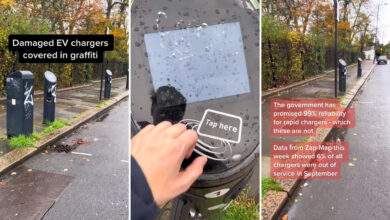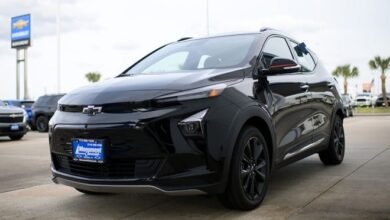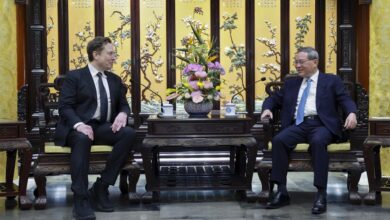Elon Musk Is Putting the EV Transition in Peril

Tesla is now facing its worst crisis in years. Last week, CEO Elon Musk laid off the automaker’s roughly 500-person Supercharger team and what remained of its policy and new vehicle teams. Before that, it reported its first-quarter financial results — and they were even worse than the lackluster performance that investors were expecting.
Already this year, Tesla has cut around 10% of its employees. Now Musk is promising that it will shift toward becoming an “AI” company.
Does Tesla, long a stalwart of America’s EV transition, now pose a danger to it? On this week’s episode of Shift Key, Rob and Jesse discuss the automaker’s turn away from EVs, and why Musk’s decision to lay off the Supercharger team could throw the entire country’s EV transition off track. Shift Key is hosted by Robinson Meyer, the founding executive editor of Heatmap, and Jesse Jenkins, a professor of energy systems engineering at Princeton University.
Subscribe to “Shift Key” and find this episode on Apple Podcasts, Spotify, Amazon, or wherever you get your podcasts.
You can also add
the show’s RSS feed to your podcast app to follow us directly.
Here is an excerpt from our conversation:
Jesse Jenkins: I just want to note one thing you said there, which is the role of the [National Electric Vehicle Infrastructure] funding. So the government funding here required that any recipient of the federal infrastructure funding would be open to multiple automakers’ vehicles. So you could not, Tesla could not have kept its network closed and received any of the federal money.
And so it is interesting to think like, you know: If NEVI hadn’t existed, I’m not sure if Tesla would have made that pivot. So it’s interesting, this is an example of where government funding and requirements can really open up standards and, you know, kind of force change. So maybe it was they thought they had to do it in order to stay competitive, to get a chunk of that federal infrastructure funding. And maybe they would have been better off if they just kept a closed network and ignored the shiny pot of money that the federal government was out there … it’s hard to say, at this point.
Robinson Meyer: There’s a second aspect of this, though, that I think is also confusing, which is basically that if Tesla — over the next year, every American who drives an electric vehicle is going to encounter a Tesla Supercharger for the first time, whether or not they own a Tesla, right? Because they’re, the vehicle they own is going to be integrated into the Tesla network and they’re going to be able to charge.
That is such a sales opportunity for Tesla. Tesla needed to nail that integration, first of all, and execution, because these are not hard customers to convince to buy a Tesla. These are customers who already own an electric vehicle. And so if they’re coming to your Supercharger network, and they’re like, ‘This is an amazing network. This, like, works so much better than any other network. This works better than the chargers that my automaker wants to direct me to that aren’t Tesla, whether they be Electrify America or something else,’ that would have been an incredible marketing and sales opportunity for Tesla to convert drivers who already had chosen to go electric.
There’s not a better market out there. There’s not a more accessible market out there for them than people who already drive an EV and are thinking about their next EV purchase. And so it has now, if nothing else, guaranteed that the next year will feel chaotic. Maybe, through some miracle, the Supercharger network keeps working, and it keeps working pretty well. How they’re going to manage that with no remaining team, I don’t really understand — but let’s say it keeps working pretty well. They’ve really fumbled an opportunity to make Tesla seem like the easiest and most secure and most reliable, you know, value proposition out there for drivers.
And I think that’s just … that’s happened now. That’s water under the bridge. They’ve really screwed this up, no matter what else happens over the next year.
This episode of Shift Key is sponsored by…
Watershed’s climate data engine helps companies measure and reduce their emissions, turning the data they already have into an audit-ready carbon footprint backed by the latest climate science. Get the sustainability data you need in weeks, not months. Learn more at watershed.com.
Music for Shift Key is by Adam Kromelow.



